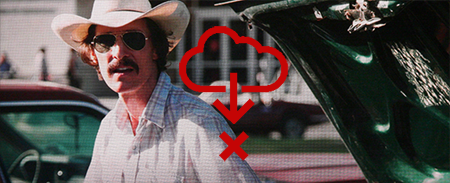The recent Federal Court decision in the Dallas Buyers Club case is the first of its kind in Australia. The decision means that the internet service providers (ISPs) involved – iiNet and others – will now have to give the Dallas Buyers Club rights holder, Voltage Pictures, the contact information of account holders who allegedly downloaded a pirated copy of the film.
Once this information is handed over, Voltage Pictures is able to send account holders a letter about the activity they allege has happened. In this case the Federal Court is reviewing all letters Voltage Pictures will be sending to account holders to make sure there is no 'speculative invoicing'. This is a fancy name for a demand for money to be paid to the rights holder for pirating the film. These letters might say that the company will take you to court if you don't pay. Speculative invoicing has been used overseas in the US, Canada and UK to intimidate consumers into paying compensation for claims of illegal file sharing.

What to do if you receive a speculative invoice
These demands can come as a rude shock and can be unnecessarily worrying for many consumers, especially those account holders who haven't done anything wrong. Sometimes the payments demanded can be high – as much as $9000. It's important to remember that these letters are only 'speculative'. This means that it has not been ordered by a court so there is no obligation for you to pay them anything.
If you receive a speculative invoice don't panic. Get independent legal advice before taking any action. You can get advice by contacting a community legal centre. These are free services that can help you to understand what you should do.
You should also ensure your home Wi-Fi is secure. Some consumers might receive a speculative invoice because someone else has downloaded pirated content using your unsecured Wi-Fi. If you're not sure how to secure your internet connection, contact your internet provider to get advice.
People with shared internet connections should also be aware of online piracy. This includes parents, grandparents, consumers who live in share houses or those who let visitors connect to their Wi-Fi/internet connection. If your internet connection is used to download pirated content, as the account holder you may receive a speculative invoice.
The Copyright Notice Scheme Code
A new Copyright Notice Scheme Code will come into effect in September 2015. This means that if someone is using your internet account to download illegally, you may get a notice warning you that the activity has been detected on your account, that it is illegal, and what you should do to stop it. It will not include a demand for money. . It's important to make sure that you or anyone else who is using your internet connection, isn't accessing pirated material. The Code will make it easier for copyright holders to identify you as the account holder if someone is illegally downloading on your internet connection. This could eventually lead to legal action from copyright holders.
While Australian consumers do get a raw deal when it comes to accessing TV shows and movies from overseas, we're starting to see more options for streaming content. These streaming services cost less than traditional pay TV services, like Foxtel, and will at least give you legal access to TV shows and movies. Find out how to access content legally on the Streamin.it website.
Photo Credit: Original photo by Helga Esteb/Shutterstock.com

Comments powered by CComment